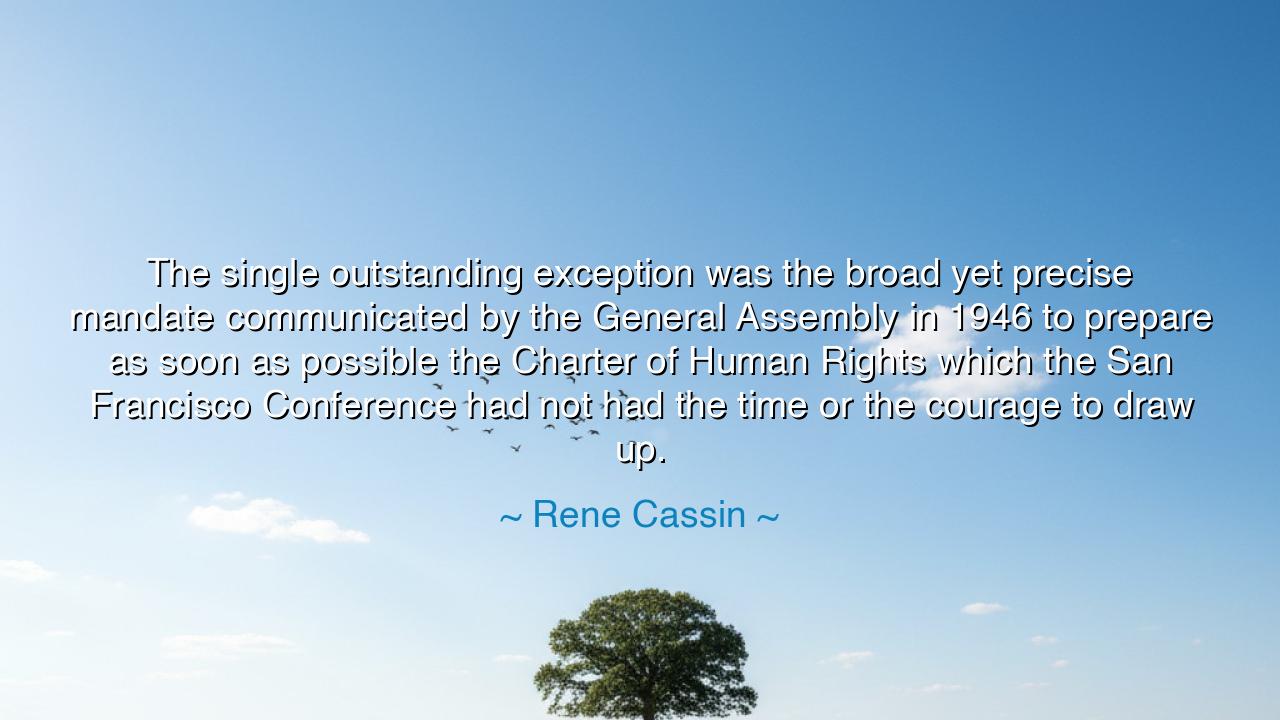
The single outstanding exception was the broad yet precise
The single outstanding exception was the broad yet precise mandate communicated by the General Assembly in 1946 to prepare as soon as possible the Charter of Human Rights which the San Francisco Conference had not had the time or the courage to draw up.






The French jurist and humanist René Cassin, one of the chief architects of modern dignity, once said: “The single outstanding exception was the broad yet precise mandate communicated by the General Assembly in 1946 to prepare as soon as possible the Charter of Human Rights which the San Francisco Conference had not had the time or the courage to draw up.” In these words lies a reflection not merely on politics, but on courage, conscience, and the birth of a new moral order after humanity’s darkest night. Cassin speaks not as a bureaucrat of history, but as a witness to suffering and rebirth — as one who saw how fragile civilization can be when justice and human rights are left unwritten, unguarded, and undefended.
The origin of this statement lies in the aftermath of World War II, when the world stood amid ashes and memory. The San Francisco Conference of 1945, which had created the United Nations Charter, had sought peace — but peace, though noble, was not enough. The conference had lacked the “time or the courage” to define the deeper laws of the human spirit — to proclaim what it meant to be human in a world that had seen concentration camps, mass graves, and the mechanized annihilation of dignity. Thus, in 1946, the General Assembly charged Cassin and others to draft what would become the Universal Declaration of Human Rights, a document that sought to codify the soul of civilization itself. Cassin’s words are both tribute and admonition: they honor the mandate that gave birth to this work, and they lament the hesitation that delayed it.
When he speaks of “courage,” he speaks not of military valor, but of moral bravery — the courage to face uncomfortable truths. For the San Francisco delegates had feared division, feared disagreement, feared perhaps that the wounds of war were too raw for the language of universal morality. Yet, as Cassin knew, it is in precisely such moments of fragility that courage must rise. The Charter of Human Rights demanded more than diplomacy; it required faith — faith in the idea that despite our differences, there exists a shared moral foundation that cannot be violated without endangering the whole of humankind. The cowardice he mourns was not the absence of strength, but the failure to trust in human unity.
Cassin himself embodied that courage. Having fought in World War I and lost much of his family to the Holocaust, he understood both the valor of nations and the suffering of individuals. He knew that peace without justice is only a pause between wars. And so he labored to give humanity a new covenant — one that would declare that every man, woman, and child, by virtue of being human, possesses inherent worth. In 1948, under his guidance and that of Eleanor Roosevelt, this dream became reality in the Universal Declaration of Human Rights. It was a charter not of conquest, but of compassion; not of power, but of principle.
History offers few documents so sacred. Like the Magna Carta, it spoke against tyranny; like the Ten Commandments, it sought to establish an ethical order for all people. Yet its creation was not an act of perfection, but of courage — the courage to begin. The world that birthed it was weary, suspicious, divided. Many doubted that words could heal wounds or that paper could defend the powerless. But Cassin believed, as the ancients did, that words, when spoken in truth, have the power to change the course of nations. Thus, his reflection reminds us that even when the world trembles, the act of moral articulation is itself an act of defiance against despair.
There is a timeless lesson in Cassin’s words. Too often in life, both individuals and nations lack the “time or the courage” to face what must be faced. We delay the just decision, we soften the inconvenient truth, we pass our responsibility to the next generation. Yet progress — whether moral, personal, or collective — begins when we find the courage to do what is difficult, not what is comfortable. The General Assembly of 1946 did not wait for perfect conditions; it acted, and through that action, it gave future generations a compass of dignity. In the same way, each of us must dare to write our own charter of values — to stand for what is right, even when silence is easier.
Let this be the wisdom drawn from the words of René Cassin: courage is the foundation of all freedom. Without it, peace becomes hollow, and justice becomes a dream. The world was once saved, not by the strength of armies, but by the resolve of those who chose to believe in humanity even after humanity had failed itself. We, too, are heirs to that calling. Wherever injustice arises, wherever fear silences truth, we must remember Cassin’s challenge — to act with the courage of conviction, to speak even when the world hesitates, and to build, as he did, the unseen scaffolding of a more human world.
Thus, may his words echo through time: that the pursuit of justice is never a matter of convenience, but of courage — and that when courage acts, civilization itself takes a step toward its better self.






AAdministratorAdministrator
Welcome, honored guests. Please leave a comment, we will respond soon